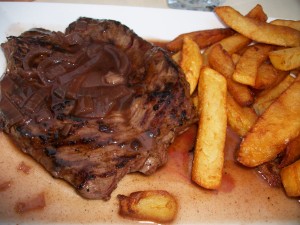Remembering Neil Armstrong and his "one small step"
Since the death of Neil Armstrong on Saturday, many remembrances have told the story about his famously flubbed first words on the moon. From Ian Crouch on The New Yorker's News Desk blog:
When the lunar module, named the Eagle, touched down, following moments of radio silence that terrified the folks back in mission control, he relayed: “Houston: Tranquility Base here. The Eagle has landed.” Later, as he made his way out of the lunar module (or LM), he described his progress in banal terms that, because of where they were coming from and what they conveyed, rose to the level of magic: “I’m going to step off the LM now.” And then he issued what is among the most famous proclamations of the last century—a jubilant counterbalance to F.D.R.’s “Day of Infamy” speech and a capstone to J.F.K.’s declaration that “we choose to go to the moon”—a statement that Armstrong had composed and prepared just hours earlier, in between the more pressing business of operating space equipment, according to Armstrong’s biographer, James Hansen: “That’s one small step for [a] man, one giant leap for mankind.”
Read the rest of this entry »
 In "
In "